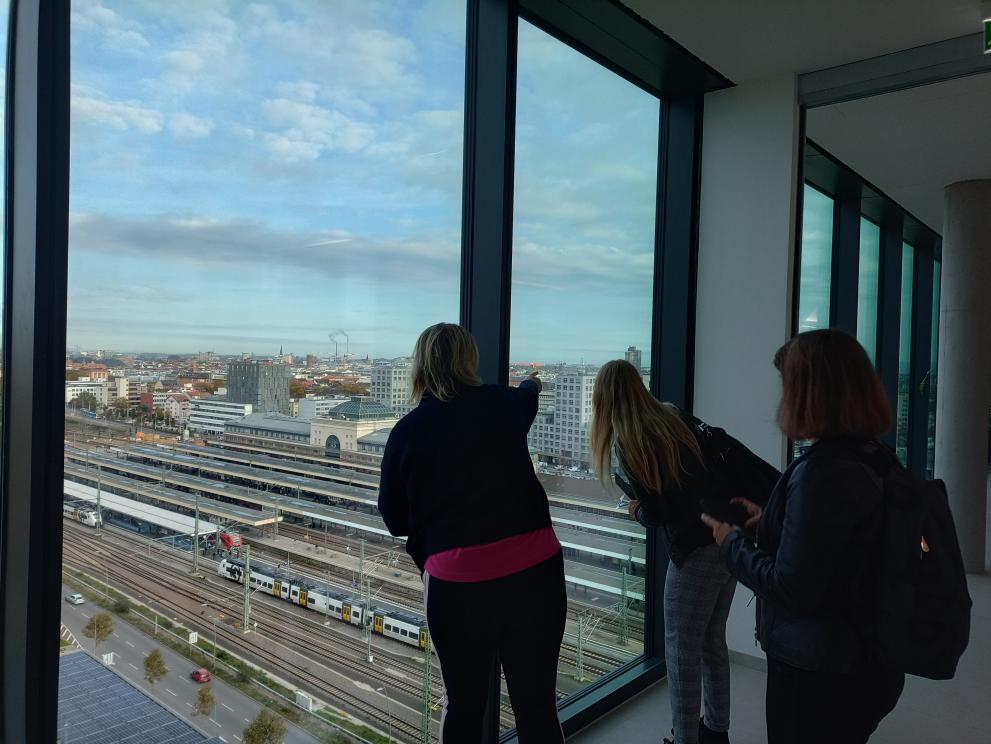
The CoM Expert Mission brings together advanced cities working towards climate neutrality to exchange ideas, build capacity, and develop lasting relationships. Conceived as a mentor-mentee programme, the Expert Mission facilitates an open exchange of ideas between participating cities.
Here are just a few of the ideas discussed during the Covenant of Mayors (CoM) Expert Mission held between Mannheim (DE) and Espoo (FI) over four days in October 2022.
Mannheim’s carbon neutrality roadmap and Local Green Deals
How can cities manage the transition to climate neutrality?
Building partnerships is key, as Mannheim knows well. At the heart of Mannheim’s roadmap is an understanding of how the city can reach its goal of 80% emission reduction by 2030, and spoiler, the city can’t do it alone. While one third of emission reductions can be achieved by the city, the other two thirds will be achieved by the city’s residents and businesses, and EU-level regulations. Given this need for collaboration, Mannheim’s iDeals stress equal responsibility for the transition and establish commitments with local residents and business to bring everyone onboard. On a city level, Mannheim has developed several Local Green Deal action fields:
- Zero pollution
- Industry and clean and circular economy
- Clean and affordable energy
- Energy and resource efficient buildings
- Sustainable and smart mobility
- From farm to fork, fair, healthy food system
- Ecosystem and biodiversity
Through these fields, the Deals are designed to ensure integrated goals between the city’s different strategies from their Sustainable Energy and Climate Action Plan (SECAP) to a Sustainable Urban Development Plan, while building collaborations outside of the city administration with residents and businesses.
So what will Mannheim’s transition team look like?
Building on the Local Green Deals and bringing together the ambition to be climate neutral by 2030, the city is developing its first non-hierarchical team of experts to navigate this journey steered by the city’s mayor and deputy mayors and supported by a working group made up of the heads of administrative departments and heads of all the deputy mayors’ offices. The city will be advised by an external expert advisory panel focused broadly on system change.
At the heart of this transition team, Mannheim will have a core team focused on an overview of the Local Green Deals and supported by Local Green Deal managers of each of the above-mentioned action fields. These managers will work with district managers – such as social NGOs and volunteers – on the implementation of Local Green Deals. The transition team, therefore, includes all stakeholders from city employees, external experts, and local businesses, NGOs, and residents.
Now Mannheim is continuing its work with a Local Green Deal platform and movement – a ‘house of change’ – to create ownership of actions to address the ‘value action gap’ in which we are motivated more to avoid loss than to achieve gain.
Espoo’s Story and Sustainable Espoo Programme
Espoo aims to be climate neutral by 2030 - five years ahead of the national Finnish target to be climate neutral by 2035 - and is committed to achieving the UN’s Sustainable Development Goals (SDGs) by 2025. These aims are elaborated within the Espoo Story – the city’s strategy – a vision and framework for Espoo to be a responsible and humane pioneer city and a good place for everybody “to live, learn, work and be an entrepreneur”, with goals to take care of biodiversity and achieve carbon neutrality by 2030 through cooperation with businesses, universities and other communities as well as residents:
- Espoo is the top city for culture and education in Finland
- Espoo provides services together with the entire Espoo community
- Espoo is economically sustainable and offers competitive taxation
- Espoo is an internationally attractive capital of entrepreneurship and innovation
- Espoo is an attractive city close to nature and a safe place to live
- Espoo will achieve carbon neutrality by 2030
- Espoo is Finland’s best city for integration
Again, collaboration is key.
The city is working in a cross-administrative manner with businesses, universities and residents to develop, test and implement sustainable urban solutions through the Espoo Sustainable Development Programme to implement these goals. Active development work and an ecosystem-based approach aims to promote business activities, the green transition, employment and the economy in Espoo and throughout the capital region. On a city level, this programme implementation is supported by experts in a Centre for Excellence for Sustainable Development (CESD) which promotes and steers city level cross-sectoral sustainable development and climate work. split into three departments: 1). Climate, Energy, SDGs, 2). Urban development and circular economy, 3). Transport and digitalisation.
But how is all this monitored?
The Espoo Climate Watch is a digital tool being developed to communicate progress on Espoo’s climate action, and evaluate its impact. As part of this tool, the city is updating emission reduction scenarios.
Building on these extensive strategies, programmes and monitoring tools, the city is now working on a combined carbon neutrality roadmap and Climate City Contract, as well as putting together its transition team as part of the 100 Climate Neutral and Smart Cities Mission. There’s even more to come in 2023 for the city of Espoo …
Details
- Publication date
- 30 January 2023
